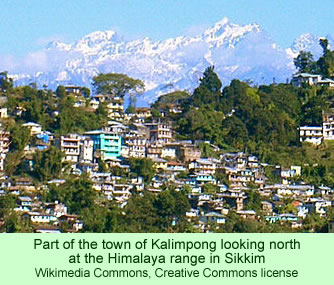Trouble in India’s West Bengal state involving the Gorkhas and the Lepchas was in the news last week, as violence again disrupted life in the hills of North India where these people live. The dispute between the Gorkhas, the Lepchas, and the government of West Bengal made headlines in India early in February, as the Gorkha threats of violence became a normal staple of Indian news.
 At the beginning of last week, the Trinamul Congress, the political party that rules West Bengal, announced that it would hold a public meeting during the third week of March to advocate development in the hills of the state. The government’s proposed meeting will be held in either Kalimpong, a town with a large number of Lepchas, or in Mirik, another town about 20 miles away where some Trinamul leaders live.
At the beginning of last week, the Trinamul Congress, the political party that rules West Bengal, announced that it would hold a public meeting during the third week of March to advocate development in the hills of the state. The government’s proposed meeting will be held in either Kalimpong, a town with a large number of Lepchas, or in Mirik, another town about 20 miles away where some Trinamul leaders live.
The meeting will be scheduled to coincide with strikes planned for the same time, the third and fourth weeks of March, by the Gorkha Janmukti Morcha (GJM), the Gorkha group that is agitating for an independent state for themselves. Plans announced by the chief Minister of the state at the end of January that would focus development on the Lepcha people prompted the anger of the Gorkhas, who live in the same hilly area of the state.
Rajen Mukhia, who is coordinating the proposed public meeting for the state government, has been meeting with Mukul Roy, a prominent politician at the national level in India. Mr. Roy is the representative to the upper house of the Indian Parliament from West Bengal. Mr. Mukhia indicated that Mr. Roy would attend the public meeting. The purpose of the meeting, Mukhia said, was to “apprise the hill people of Trinamul’s principal objective to expedite all-round development across the hills.”
In other words, the government is trying to indicate that their proposals for more development are not intended to undercut the Gorkhas. The leader of the GJM, Bimal Gurung, decided to counter this move by the state government by going to New Delhi to meet both the national president and the home minister of India. Observers were hopeful that, if things went well in New Delhi, the proposed 48 hour general strike might be put off by the GJM.
News sources on Tuesday last week reported that the GJM delegation, led by Mr. Gurung, had met with home minister Sushil Kumar Shinde and argued their case for Gorkhaland. They blamed the current problems in the state entirely on Mamata Banerjee, the Chief Minister of West Bengal. They pressed their long-standing demand for tribal status for the Gorkha community in the West Bengal hills.
The home minister evidently listened carefully to the GJM demands. In response, he asked the delegation to call off the announced general strike, which was scheduled for March 14 and 15, and again for March 21 and 22. The GJM promised to review the matter with their committee when they return to Darjeeling.
Matters turned more serious on Wednesday, when a meeting of 10 to 15 Trinamul (also spelled Trinamool) Congress members taking place in a hotel in Kalimpong, was disrupted by a group of thugs. Just as the Trinamul members were about to hold a news conference, around 30 people, believed to represent the youth wing of the GJM, assaulted them with sticks and iron rods. Two people were injured, four of the attackers were arrested, and the police are trying to catch the others.
The Times of India news report indicated that important leaders of the Bhutia and Lepcha communities in Kalimpong were targeted by the attackers. Chewang Bhutia and Bruno Lepcha were covered in blood and rushed to a hospital after the attack. A Trinamul official in charge of the Darjeeling area, Gopal Chhetri, expressed the government’s anger at the attack.
“There is no democracy in the Hills in the misrule of the GJM party. Our leaders and supporters are intimidated every other day and today they were even attacked,” Mr. Chhetri said. An official for the GJM denied that his group had anything to do with the violence.
On Friday, police in West Bangal announced the arrest of additional people who had allegedly been involved in the attack. The national government has indicated a willingness to get involved and has agreed to send several battalions of troops to help the state police restrain the growing threats of violence.
The GJM leaders, still in New Delhi, argued that the whole thing is a conspiracy by the West Bengal government to create a state of terror in the hills so they can deploy their troops. According to Jyoti Kumar Raj, the assistant secretary of GJM, “there is no trouble in the Hills whatsoever. The deployment of security forces is a ploy of the state government to create panic and terror.”
The Lepchas, who are simply asking for some development assistance from the state, and are willing to endure hunger strikes to dramatize their plight, appear from the news reports to be pawns in the power play between the government and the Gorkha leaders.